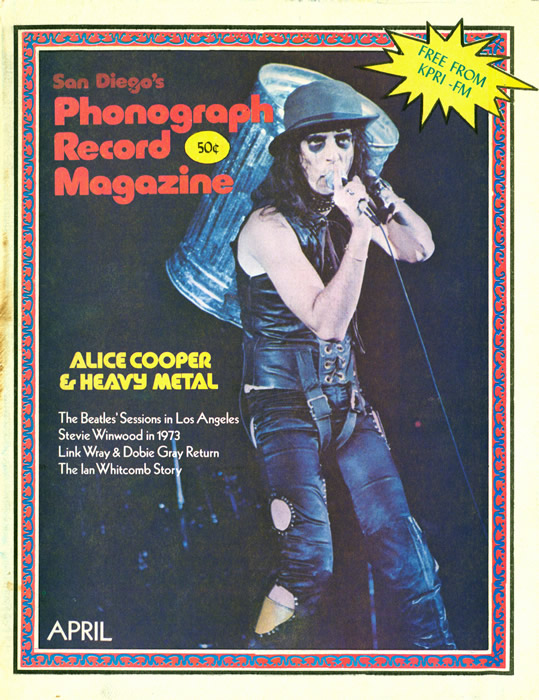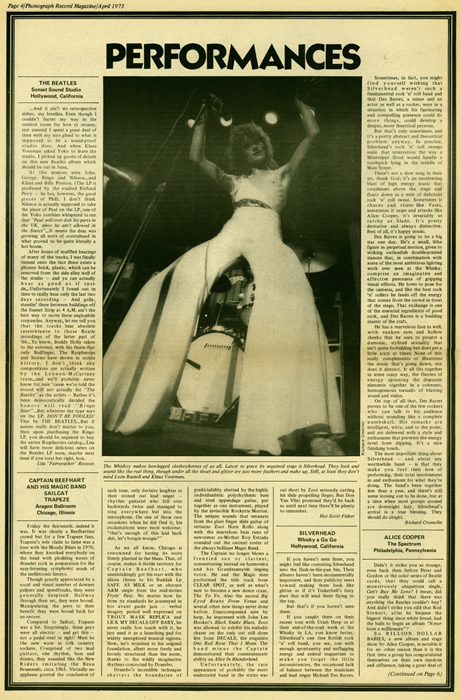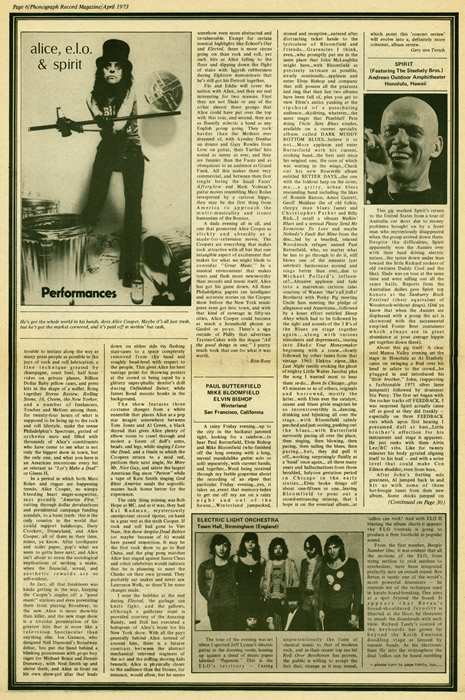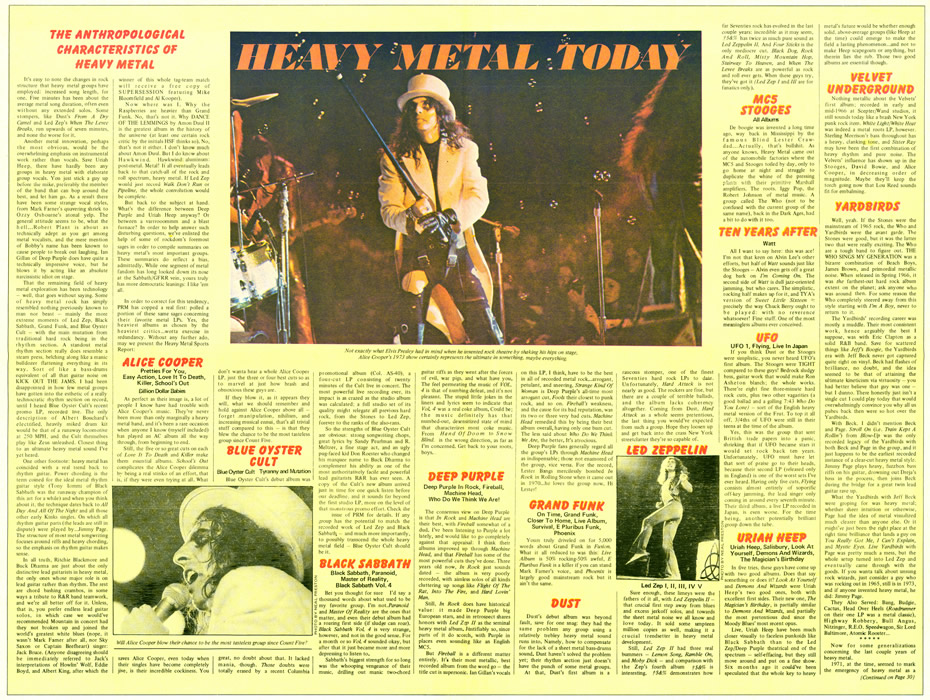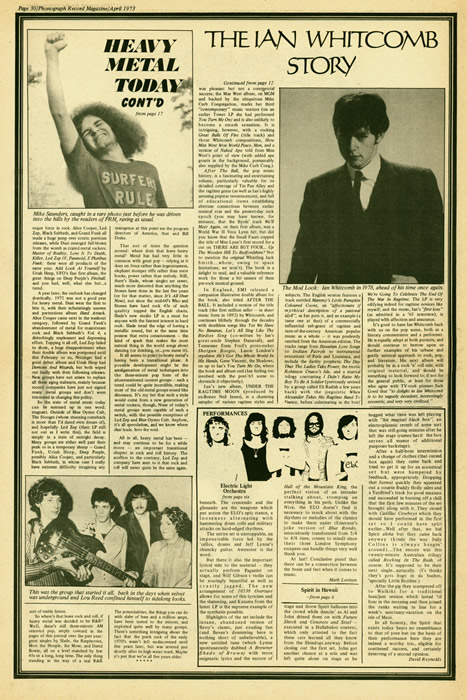Article Database
Alice Cooper
The Spectrum, Philadelphia, Pennsylvania
Didn't it strike you as strange, even back then before Peter and Gordon or the color series of Beatle cards, that they could call a monstrously ubiquitous single, Can't Buy Me Love? I mean, did you really think that there was anything the Beatles couldn't buy? And didn't strike you as odd that Rod Stewart, after he became the biggest thing since white bread, had the balls to begin an album "Never been a millionaire"?
So BILLION DOLLAR BABIES, a new album and stage show by Alice Cooper, is notable if for no other reason than it is the first time a group has congratulated themselves on their own stardom and affluence, taking a great deal of trouble to initiate along the way as many press people as possible in the joys of rock and roll lubrication, a fine technique greased by champagne, roast beef, half hour rides on private planes, Billion Dollar Baby pillow cases, and press kits in the shape of a wallet. Bring together Stereo Review, Rolling Stone, 16, Creem, the New Yorker, and a number of freelancers, Tosches and Meltzer among them, for twenty-four hours of what is supposed to be living up to the rock and roll lifestyle, make the venue Philadelphia's Spectrum, gutted of orchestra seats and filled with thousands of Alice's constituents who have come to see what is not only the biggest show in town, but the only one, and what you had is an American microcosm every bit as relevant as "Let's Make a Deal" or Gleem II.
In a period in which both Marc Bolan and reggae are happening trends, Alice Cooper, no whimpy bleeding heart singer-songwriter, says proudly "America First," cutting through dollar devaluations and presidential campaign funding scandals, to a basic truth: this is the only country in the world that could support hulahoops, Davy Crockett, Disneyland, and Alice Cooper, all of them in their time, mints, ya know. After toothpaste and toilet paper, pop's what we seem to gotta have next, and Alice isn't about to stress the sociological implications of necking a snake, when the financial, sexual, and aesthetic rewards are so self-evident.
In fact, all that freakiness was kinda getting in the way, keeping the Cooper's singles off a "good music" stations and even preventing them from playing Broadway, so the new Alice is more show-biz than killer, and the new stage show is a tri-color presentation of his greatest hits that is more like a television Spectacular than anything else. Joe Gannon, who designed Neil Diamond's Broadway debut, has put the band behind a blinking proscenium with go-go boy cages for Michael Bruce and Dennis Dunaway, with Neal Smith up and above them, and Alice in front on his own show-girl altar that leads down on either side via flashing stair-cases to a space completely removed from the band and roughly head-level with respect to the people. This gives Alice his best vantage point for throwing posters at the crowd or being raped by a glittery super-phallic dentist's drill during Unfinished Sweet, while James Bond moozic honks in the background.
The show features three costume changes from a white ensemble that places Alice as a pop star imagist somewhere between Tom Green and Al Green, a black shroud that gives Alice plenty of elbow room to crawl through and molest a forest of doll's arms, heads, and legs, while singing I Love The Dead, and a finale in which the Coopers return to a mod red, preform their next single, No More Mr Nice Guy, and salute the largest American flag since "Patton" while a tape of Kate Smith singing God Bless America sends the soporific masses back home better for the experience.
The only thing that was missing was Bob Hope as MC, and as it was, they had Kal Rudman, mysteriously omnipotent record tipster, on hand in a gear vest as the sixth Cooper. If rock and roll had gone to Viet Nam, this show despite Dead Babies (or maybe because of it) would have passed inspection. It may be the first rock show to go to Red China, and the ping pong matches Alice has staged against Santa Claus and other celebrities would indicate that he is planning to meet the Chinks on their own ground. They probably eat snakes and never saw Lawrence welk, so there'll be some changes made.
I miss the bubbles at the end during Elected, the garbage can knife fight, and the gallows, although a guillotine stunt is provided courtesy of the Amazing Randy, and Dali has executed a hologram of Alice's brain for his New York show. With all the guys generally behind Alice instead of around him, there is a bizarre contrast between the abstract mechanical televised staginess of the act and the milling shoving kids beneath. Alice is physically closer to the audience than the Stones, for instance, but he seems somehow even more abstracted and invulnerable. Except for certain musical highlights like School's Out and Elected, three is more circus going on than rock and roll, yet such bits as Alice falling to the floor and slipping down the flight of stairs with Iggyish rubberiness during Eighteen demonstrates that he's still got his Detroit together.
Flo and Eddie will cover the nation with Alice, and they are real interesting for two reasons. First they are not Slade or any of the other almost there groups that Alice could have put over the top with this tour, and second, they are fluently eclectic a band as any English group going. They rock harder than the Mothers every dreamed of, with Aynsley Dunbar on drums and Gary Rowles from Love on guitar, their Turtles' hits sound as sunny as ever, and they are funnier than the Faces and as obsequious to an audience as Grand Funk. All this makes them very commercial, and between their first singly being the Small Faces' Afterglow and Mark Volman's guitar moves resembling Marc Bolan interpreted by a cartoon hippo, they may be the first thing from America to approach the multi-musicality and ironic humanism of the Bonzos.
A dada evening all in all, and one that promoted Alice Cooper as slickly and absurdly as a made-for-television movie. The Coopers are everything that makes rock attractive with all but that one intangible aspect of excitement that makes for what we might blush to consider "Great Music." In a musical environment that makes tour and flash more newsworthy than the records and music itself, Alice has got this game down. All three Philadelphia papers ran intelligent and accurate stories on the Cooper show before the New York music press even got into town, and with that kind of coverage in fifty-six cities, Alice Cooper could become as much a household phrase as Gardol or yo-yo. There's a sign outside of Philly that advertises Taystee-Cakes with the slogan "All the good things in one." I pretty much took that one for what it was worth.
Heavy Metal
A brief survey of the state of Metal Music Today
Author: Mike Saunders
When you get right down to it, the story of heavy metal rock has been the tale of Led Zeppelin. As indicated by its name, Heavy Metal has been an evolution of heavy rock - you know, the stuff that emerged back in 1967. Heavily revved-up bass, long guitar solos, deluges of fuzzbox and wah-wah. From Cream to Blue Cheer; Jimi Hendrix to the Hook; Jeff Beck to Ten Years After...
The ground work for this stuff had previously been laid by stunning 1965 second-wave English groups like the Yardbirds and The Who, Pete Townshend and Jeff Beck has been the first guitarists to achieve idol stature in the Sixties white rock 'n' roll. But somehow, in the interim, the idea of hard, heavy rock had disintegrated into amphetamine blues technology and the wounded elephant guitar shrieks of Iron Butterfly. Worse yet, 1967-8 was the year of Cream.
Cream were monstrously popular among both critics and their myriad of fans. I even remember reading praises of their monochardic, so-called improvisations in Downbeat, the rationale I guess being that rock had grown up, become serious music. My most indelible memory of 1968 is that of being exposed to Wheels of Fire some 300 times, which would have been enough to send on running for Blue Cheer except for the fact that early Blue Cheer were really just about as bad as their own inimitable way.
What I'm getting at is that Led Zeppelin did not meet with the same sort of audience/critic response as Cream, Led Zeppelin were absolutely slagged by the press. For the first time, a visible chasm had opened in the previously monolithic rock audience (a chasm that was to continue to deepen with Grand Funk, Black Sabbath, and to a lesser extent, Alice Cooper): a gap between, if you will, what was Good Music and what the kids were actually listening to.
The Anthropological Characteristics of Heavy Metal
It's easy to not the changes in rock structure that heavy metal groups have employed: increased song length, for one. Five minutes has been about the average metal song duration, often even without any extended solos. Some stompers, like Dust's From A Dry Camel and Led Zep's When The Levee Breaks, run upwards of seven minutes, and none the worse for it.
Another metal innovation, perhaps the most obvious, would be the overwhelming emphasis on instrumental work rather than vocals. Save Uriah Heep, there have hardly been any groups in heavy metal with elaborate group vocals. You just stick a guy up before the mike, preferably the member of the band that can bop around the best, and let him go. As a result there have been some strange vocal styles, from Mark Farner's quavering shriek to Ozzy Osbourne's atonal yelp. The general attitude seems to be, what the hell... Robert Plant is about as technically adept as you get among metal vocalists, and the mere mention of Bobby's name has been known to cause people to break out laughing. Ian Gillan of Deep Purple does have quite a technically impressive voice, but he blows it buy acting like an absolute narcissistic idiot on stage.
That remaining field of heavy metal exploration has been technology - well, that goes without saying. Some of heavy metal rock has simply resembled nothing previously known to man nor beast - mainly the more extreme moments of Led Zep, Black Sabbath, Grand Funk, and Blue Oyster Cult - with the main mutation from traditional hard rock being in the rhythm section. A standout metal rhythm section really does resemble a steam press, belching along like a manic bulldozer flattening everything in its way. Sort of like a bass-drums equivalent of all that guitar noise on KICK OUT THE JAMS. I had been disappointed in how few metal groups have gotten the esthetic of really technocratic rhythm section on record, until I heard Blue Oyster Cult's recent promo LP, recorded live. The only description of Albert Bouchard's electrified, heavily miked drum kit would be that of a runaway locomotive at 250 MPH, and the Cult themselves play like Zeus unleashed. Closest thing to an ultimate heavy metal sound I've yet heard.
One other footnote: heavy metal has coincided with a real trend back to rhythm guitar. Power chording is the term coined for ideal metal rhythm guitar style (Tony Iommi of Black Sabbath was the runaway champion of this art for a while) and when you think about it, the technique dates back to All Day And All Of The Night and all those other early Kinks singles. On which all rhythm guitar parts (and leads are sill in dispute) were played by... Jimmy Page. The structure of most metal songwriting focuses around riffs and heavy chording, so the emphasis on rhythm guitar makes sense.
In all truth, Ritchie Blackmore and Buck Dharma are just about the only distinctive lead guitarists in heavy metal, the only ones whose major role is on lead guitar rather than rhythm guitar. The rest are chord bashing crambos, in some ways a tribute to R&R band teamwork, and we're all better off for it. Unless, that is, you prefer endless lead guitar solos , in which case we would've recommended Mountain in concert had they not broken up and joined the world's greatest white blues (nope, it wasn't Mark Farner after all, nor Sky Sazon or Captain Beefheart) singer: Jack Bruce. (Anyone disagreeing should be immediately referred to Jack's interpretations of Howlin' Wolf, Eddie Boyd, and Albert King, after which the winner of this whole tag-team match will receive a free copy of SUPERSESSION featuring Mike Bloomfield and Al Kooper).
Now where was I. Why the Raspberries are heavier than Grand Funk. No that's not it. Why DANCE OF THE LEMMINGS by Amon Duul II is the greatest album in the history of the universe (at least one certain rock critic by the initials HSF thinks so). No, that's not it either. I don't know much about Amon Duul. But I don know about Hawkwind. Hawkwind: aluminum: post-metal. Metal! It all eventually leads back to the catch-all of rock and roll spectrum, heavy metal. If Led Zep would just record Walk Don't Run or Pipeline, the whole convolution would be complete.
But back to the subject at hand. What's the difference between Deep Purple and Uriah Heep anyway? Or between varrrooommm and a blast furnace? In order to help answer such disturbing questions, we've enlisted the help of some of rockdom's foremost sages in order to compile summaries on heavy metal's most important groups. These summaries do reflect a bias, fandom has long looked down its nose at the Sabbath/GFRR vein, yours truly has more democratic leanings: I like 'em all.
In order to correct for this tendency, PRM has copped a real first: polled a portion of these sages concerning their favorite metal LPs. Yes, the heaviest alums as chosen by the heaviest critics... wotta exercise in redundancy. Without any further ado, may we present the Heavy Metal Sports Report.
Alice Cooper
Pretties For You, Easy Action, Love It To Death, Killer, School's Out, Billion Dollar Babies
As perfect as their image is, a lot of people I know have had trouble with Alice Cooper's music. They've never been more than only a marginally a heavy metal band, and it's been a rare occasion when anyone I know (myself included0 has played an AC album all the way through, from beginning to end.
Still, the five or so great cuts on each of Love It To Death and Killer make them essential albums. School's Out complicates the Alice Cooper dilemma by being a real stinko of an effort, that is, if they were trying at all. What saves Alice Cooper, even today when their singles have become completely jive, is their incredible cockiness. You don't wanta hear a whole Alice Cooper LP, just the three or four best cuts so as to marvel at just how brash and obnoxious these guys are.
If they blow it, as it appear they will, what we should remember and hold against Alice Cooper above all - forget manipulation, nihilism, and increasing musical ennui, that's all trivial stuff compared to this - is that they blew the chance to be the most tasteless group since Count Five.
****
Now, for some generalizations concerning the last couple of years of heavy metal.
1971, at the time, seemed to mark the emergency of heavy metal as a major force in rock. Alice Cooper, Led Zeppelin, Black Sabbath, and Grand Funk all made a huge jump over erratic previous releases, while Dust emerged full-blown from the womb as crazed metal rockers. Master of Reality, Love It To Death, Killer, Led Zep IV, Paranoid, E Pluribus Funk: these were all products of the same year. Add Look At Yourself by Uriah Heep, UFO's fine first album, the great things on Deep Purple's Fireball, and you had, well, what else but... a trend.
A year later, the outlook has changed drastically. 1972 was not a good year for heavy metal. Dust were the first to bite it, with their infuriatingly uneven and pretentious album Hard Attack. Alice Cooper came next in the washout category, followed by Grank Funk's abandonment of metal for mainstream rock and Black Sabbath's Vol. 4, a disturbingly unpleasant and depressing effort. Topping it all off, Led Zep failed to show, a huge disappointment when their double album was postponed until this February or so. Nitzinger had a good debut album and Uriah Heep had Demons and Wizards, but both wiped out badly with their following releases. New groups have not arisen to replace all these aging stalwarts, mainly because record companies have just not signed many metal groups and don't seem interested in changing this policy.
So the state of metal music today can be summed up in one word: stagnant. Outside of Blue Oyster Cult, The Stooges (whose stunning comeback is more than I'd dared even dream of), and hopefully Led Zep (their LP still not out yet as I write this), the field is simply in a state of outright decay. Many groups are either well past their peak or in a temporary slump - Grand Funk, Uriah Heep, Deep Purple, possibly Alice Cooper, and particularly Black Sabbath, in whose case I really have extreme difficulty imagining any sort of viable future.
So where's that leave rock and roll, if heavy metal was decided to be R&R? Well, there's still three-minute AM oriented pop, amply covered in the pages of this journal over the past year: great singles by Slade, the Raspberries, Mott the Hoople, the Move, and David Bowie, all on a level matched by a few 45s in a long, long time. The only thing standing in the way of a real R&R resurgence at this point are the program directors of America, that and Bill Drake.
That sort of tums the question around: where does that leave heavy metal? Metal has had very little in common with great pop - relying as it does on forces rather than ingeniousness, elephant stomper riffs rather than mere hooks, power rather than melody. Still, there's Slade, whose singles are rawer, much more distorted than anything the Stones have done in the last five years (of for that matter, since It's All Over Now), not since the mid-60s Who and Stones have hard rock 45s of such quality topped the English charts. Slade's new studio LP is a must for anyone with the faintest interest in hard rock: Slade tread the edge of having a metallic sound, but at the same time possess that extra consciousness - the kind of spark that makes the most natural thing in the world songs about dancing (or drinking, or... you name it).
It all seems to point to heavy metal's having been a transitional phase. A possible development might be the amalgamation of metal techniques into the three-minute pop form of the aforementioned current groups - such a trend could be quite incredible, making most of the old metal groups sound like dinosaurs. It's my bet that such a style would come from a new generation of metal rockers, though. None of today's metal groups seem capable of such a switch, with the possible exceptions of Led Zep and Blue Oyster Cult. Anyhow, it's all speculation, and we know where that leads. Into the void.
All in all, heavy metal has been - and may continue to be for a while more - an important transitional chapter in rock and roll history. The scoffers to the contrary, Led Zep and company have seen to it that rock and roll will never quite be the same again. The potentialities, the things you can do with slabs of bass and a million amps, have been tested to the utmost, and exploited quite well by many groups. There's something intriguing about the fact that the punk rock of the early 1970's wasn't left undiscovered until five years later, but was revered just shortly after its high water mark. Maybe it's just that we're all five years older.



